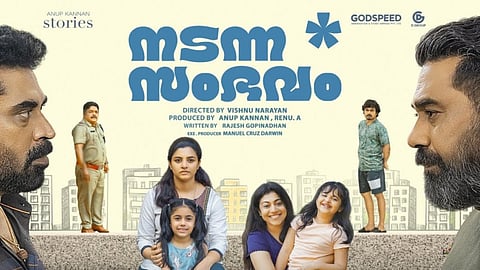

In a telling scene in the first act of Nadanna Sambhavam, Ajith—also known as Ajithettan (Suraj Venjaramoodu)—is in the midst of one of his regular drinking sessions with his close friends. The wolf pack represents different shades of entitled men, with unmistakable moralistic tendencies to pry into others' lives unnecessarily, including an undesirable online media journalist (an effective Sudhi Koppa). When someone from the group enquires about his recent holiday abroad with his family, Ajith immediately likens his wife, Dhanya (Lijomol Jose), and daughter to a heavy sack on his head, while equating the trip to the grandeur of Thrissur Pooram. Moments before this uncomfortable exchange, Dhanya’s face suddenly turns dismal when Ajith takes a selfie during their daughter’s birthday celebration, highlighting their dysfunctional marriage due to his indifference.
Directed by: Vishnu Narayan
Cast: Biju Menon, Suraj Venjaramoodu, Lijomol Jose, Shruti Ramachandran, Johny Antony, Sudhi Koppa
In contrast, we are soon introduced to a lovey-dovey husband and wife, played by Biju Menon and Shruti Ramachandran, who recently moved into the urban housing community as Ajith’s neighbours. Along with their daughter, they seem to have a healthy relationship as a couple living on equal terms. The unassuming manner in which the dynamics of their marriage are portrayed is quite beautiful, with spot-on chemistry between the actors. Take, for instance, the sight of the wife driving a dashing black jeep to work every day, while her dapper husband takes care of the house and their child. The film treats it as a normal thing, despite the envious eyes of the women around. Being a "people person," as proudly described by his wife, Unni aka Unniyettan (Biju Menon), is a popular figure among the women in the community for being a sincerely good listener and for his sociable nature.
Nadanna Sambhavam uncannily reminds one of Ayalathe Adheham (1992), which also featured two diametrically different kinds of couples, with the chivalrous man among them being the source of conflict. While the latter film's writing ultimately made a strong case for questionably furthering stereotypes, Rajesh Gopinadhan's screenplay uses this plot point to explore gender dynamics and female desire in a rather welcoming manner. In one of its refreshing moments, a female police constable spontaneously tells her male superior that there is nothing wrong with a married woman having adult discussions with anyone she wishes, irrespective of gender.
While Biju and Suraj were adequately worthwhile in their respective parts, it is Lijomol Jose who steals the show with a fully fleshed-out character arc that requires the actor to be both vulnerable and assertive. The scene where Dhanya vents all her pent-up anger to a station house officer stands out, especially for the way the actor delivered her lines with gravitas.
While it has a lot going for it, even without the fair share of laughs it ideally needs, Vishnu Narayan's narrative stretches beyond the threshold. Set mainly inside a police station during its latter hour, the makers bombard us with many redundant sequences intended to ooze humour. While it sporadically elicits a laugh or two, these segments fall flat as a whole because they come and go randomly, hardly serving any purpose to the central plot.
Another factor that weighs down the film is its predictability. As the film presents its central conflict involving Ajith and Unni, you know where this is going to go. It was also quite ironic to watch the way the film opts to present a clash of testosterone between its leading men in a pivotal moment, given its potent commentary on toxic and fragile masculinity. However, it ends with a redeeming payoff tied to a striking shot in its initial stretch.
On the whole, Nadanna Sambhavam plays out like an antithesis to Ayalathe Adheham, which could have been crisper and focused in its approach, with added effort in its humour.